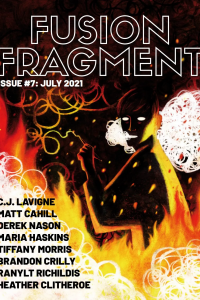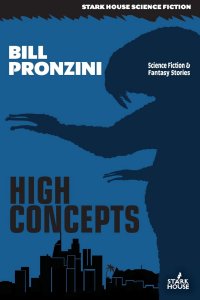Karen Burnham Reviews Short Fiction: Clarkesworld, Breathe Fiyah, and Tor.com
 Clarkesworld 10/20, 11/20
Clarkesworld 10/20, 11/20
Breathe Fiyah 10/19/20
Tor.com 10/21, 10/28, 11/11, 11/18/20
While many of Locus‘s reviewers are deeply entrenched in 2021, I’ll be spending this month and the next wrapping up everything I can from 2020. The joy of online publication is the ease of getting content quickly, but it means I rarely get to see issues in advance. So please enjoy these last hurrahs of an otherwise insane year, and make sure to keep stories from the end of 2020 in mind when it comes time for award nominations and voting.
October’s Clarkesworld leads off with a beautifully quiet story by Brenda Cooper, “Callme and Mink“. Julie is a robot who trains service dogs. Although she’s moved around a lot in this post-collapse future, she’s settled in a seaside town, where she’s been training a younger dog for some time when a local shopkeeper refers a wandering family to her. They have an ailing daughter, unable to walk on her own, and Julie decides that they’re a worthy fit for Mink. She takes the time to train the family on how best to handle and provide for the dog. There are nice touches as Julie has to maintain her own programming and figure out the best path for herself.
A very different future has played out in “Ashes Under Uricon” by Adrastos Omissi. Lottie is wandering a Europe completely devoid of human life; as far as she can tell all humans have been hunted to extinction by autonomous war machines. She has to dodge them while also searching for spare parts to maintain herself, and she keeps hoping to find some evidence that any humans have survived. She has a flash of hope when she encounters an immaculately maintained estate, but outside there is only a very dedicated grounds-keeper bot and inside…. Much like Cooper’s story, this one is quietly poignant.
Gregory Feeley and D.A. Xiaolin Spires both take us out into space for their stories. Feeley’s “Wandering Rocks” imagines a multi-generational ship out by Neptune. A few years before the story’s start there was a rebellion, and the rebels ended up taking off for some of the nearby moonlets. Now Koishi’s student project to explore the moon Naiad is being co-opted by one of the ship’s AI Beings who wants to know what’s happened to the rebels there – and more particularly to the Beings who went with them. Koishi is a really a pawn in a larger story, which doesn’t necessarily make for the most satisfying ending, but it’s a good mystery unfolding in a very low gravity environment. Spires’s story “Last Wishes” is a novelette in which Jinying was very close to her mother, despite them being very different people. Her mother’s last wishes are personified by a puzzle vase which Jinying is trying to solve during the proscribed mourning period. She smuggles her mother’s remains off planet to her next assignment as a linguist, eventually accepting help from the community she’s studying. At the end she is starting to figure out what shape her life might take without her mother in it; this is a deeply personal and heartfelt story.
Greg Egan provides a near-future SF story in “You and Whose Army?” Rufus, Caius, Silus, and Linus are quadruplets engineered with a permanent brain link by a now defunct cult. In their adult life they still share experiences every night as they dream – until Linus shuts off his link without notice. Rufus is dispatched to search for him as they try to figure out whether he dropped out voluntarily or if foul play is involved. There’s some fun sleuthing going on, including a bit of shameless social media manipulation, as they narrow in on him. The siblings go a little bit off the rails when they think an immortality-obsessed nonagenarian billionaire is using Linus for his own ends, but Linus turns out to have a lot more going on than they’d ever suspected.
There’s a lot of family drama in November’s Clarkesworld. Jana Bianchi‘s “Death is for Those Who Die” imagines a world where people are much more likely to live past 100 years. Jan is an older woman with a helper bot, Diadorim. We get a slice of her life: struggling to stay connected to her busy son, meeting with friends and sharing food and memories, musings on literature, and how her bot learns about her and her life. The ending is quite a tearjerker as she comes to the natural end of her life with Diadorim at her side. “Lost in Darkness and Distance” by Clara Madrigano imagines a close-knit family descended from immigrants from Brazil to the US. Mia was particularly close to her cousin Charlie, but he died young at age 18, causing a rift in the family. Now Charlie’s rich father has asked the rest of the family to join him on an island that’s home to the Clinic…. The focus of the story is really the multi-generational family relationships, tightly wrapped up in the immigrant grandparents’ hopes and expectations, both in terms of class and race, before we get to the explosive revelation of what (who) they find at the Clinic. Mia comes across as a very strong character with a lot of nuance, and the ending of the story has a great balance between tragedy and redemption. “Niuniu” by Baoshu (translated by Andy Dudak) is a novelette that imagines a couple who don’t have the best relationship but did truly love their baby daughter, nicknamed Niuniu. As the story unfolds and we see the father becoming more and more alienated from the little girl, we learn that she actually died tragically several years before and what he’s been dealing with is an artificial replacement that cannot actually grow any older. He confronts his wife over her willingness to stay trapped in a cycle of caring for this simulacrum, which leads to more tragedy.
Elsewhere in the issue is a rollicking space pirate story by A.C. Wise, “To Sail the Black“. Antimony Jones has pledged her death to the ghost ship Xanthic Promise (as have all the crew), which she signed onto as a girl enchanted by the idea of star spirits animating and powering the ships. She’d left such romantic notions behind her as she worked her way up the ladder to finally assume the captaincy, but now everything is going to hell as certain crew members appear to be mutilating themselves and the ghosts of former captains are no help at all. Antimony is desperately trying to figure everything out while clinging to her hard-won, hard-nosed “pirate captain” persona, but she’s going to have to change a lot of her understanding of the world, both physical and personal, to be able to think her way out of this mess. A lot of fun. Brady Nelson & Jamie Wahls bring us the cleverly done “The Murders of Jason Hartman“. Told in Q&A style but with all the Q’s left blank, it is the testimony of a particular “Sikoshi” teenager, one who’s been engineered for brilliance and kept in an Academy with other similar kids, told they’re supposed to save the world, and made to compete for advancement. It’s a recipe for sociopathy, which he doesn’t shy away from describing, but there’s also murder(s) at his feet. This short story paces its reveals nicely and the narrator has an enjoyable snark to him.
I’d also like to point out that in his November column, editor Neil Clarke mentioned that he’s hoping to bring more Spanish-language SF/F to Clarkesworld’s pages, just as he’s had so much success bringing more Chinese and Korean fiction across in partnerships with different organizations. If you’re bilingual or have special knowledge of Spanish language speculative fiction, I’d encourage you to read the editorial and reach out to Neil if it seems like something you could help with.
In October Tor.com put together a special flash fiction collection of eight stories titled Breathe Fiyah featuring authors from the African diaspora. They’re well worth checking out, starting with “Sela, Thief” by Zabe Bent. Sela is a university professor, but just trying to pick up some comfort food in the local market leads to her being eyed as a potential thief, with the owner even enlisting one of her own students to tail her. She’s been trying not to use her powers on these people, but she eventually snaps and sets out to tackle the racism directly and magically. “Conjurer’s Rites” by Jen Brown features a woman who is supposed to use her magic to entertain at her wealthy family’s reunion, but she has never let herself fully learn the magic from her mother. After bombing the first night, an aunt takes pity on her and she truly commits herself to the craft. The next night she’s able to totally kill it with the tale of her ancestor Betty Grave’s “Greatest Heists.” “The Front Line” by WC Dunlap focuses on the perception of Black women’s bodies, especially those perceived to be obese, and how they are almost constantly traumatized, especially by the medical profession. In this story the main character turns her body into armor that she can use to try to protect herself and others from more trauma. “Here Sits His Ignominy” by Tobi Ogundiran turns colonialism on its head with a message delivered back to European colonizers, a message that accompanies fairly wrathful destruction. The final story, “The Mystical Art of Code Switching” by Sydnee Thompson, starts with Black folks on Twitter/social media almost constantly having to censor themselves. Then some kind of mysterious intervention makes it so that they can read each other’s missives while no one from the dominant caste can interpret them – and what could the Black community do if able to truly freely communicate with each other?
Elsewhere on Tor.com, Usman T. Malik returns with a masterpiece in “City of Red Midnight: A Hikayat“. Using a structure of nested stories, it starts with some friends trying to conquer jet lag as they prepare to visit the Lahore ComicCon, running all the way to Taimur the Trickster, the Red Road, the Red Queen née Fatima the Dung, and her husband M_______. This is pretty much un-summarizable, but it’s a story of depth that never lets up. While the characters in the tale are generally larger-than life in the way of fairy tales, none of them are stilted archetypes. Malik breathes life into each and every one of them, including the really unpleasant aspects of their characters. Lavie Tidhar dives into the world of vampires in “Judge Dee and the Limits of the Law” where the titular judge and his human assistant are called in to investigate the case of one “young” vampire woman who may have violated ancient vampiric codes. The resolution is quite delightful. Elizabeth Bear returns to the Lovecraft mythos in “On Safari in R’lyeh and Carcosa with Gun and Camera” which gets a great in media res kick-off. We follow a physicist who was adopted as a young girl and finally tries one of those online DNA ancestry tests to try to learn something about her origins. When the results come back… strange… she teams up with a geneticist friend to try to track down some answers. The quest takes them all over the Lovecraft region of New England, and finally to a mystical portal. The mix of the fundamentally Weird aspects with the heroine’s determinedly scientific worldview and Bear’s extremely readable writing makes this a ton of fun.
Recommended Stories
“Conjurer’s Rites”, Jen Brown (Breathe Fiyah)
“Callme and Mink”, Brenda Cooper (Clarkesworld 10/20)
“Lost in Darkness and Distance”, Clara Madrigano (Clarkesworld 11/20)
“City of Red Midnight: A Hikayat“, Usman T. Malik (Tor.com 10/21/20)
Karen Burnham is an electromagnetics engineer by way of vocation, and a book reviewer/critic by way of avocation. She has worked on NASA projects including the Dream Chaser spacecraft and currently works in the automotive industry in Michigan. She has reviewed for venues such as Locus Magazine, NYRSF, Strange Horizons, SFSignal.com, and Cascadia Subduction Zone. She has produced podcasts for Locusmag.com and SFSignal.com, especially SF Crossing the Gulf with Karen Lord. Her book on Greg Egan came out from University of Illinois Press in 2014, and she has twice been nominated in the Best Non-Fiction category of the British SF Awards.
This review and more like it in the January 2021 issue of Locus.
 While you are here, please take a moment to support Locus with a one-time or recurring donation. We rely on reader donations to keep the magazine and site going, and would like to keep the site paywall free, but WE NEED YOUR FINANCIAL SUPPORT to continue quality coverage of the science fiction and fantasy field.
While you are here, please take a moment to support Locus with a one-time or recurring donation. We rely on reader donations to keep the magazine and site going, and would like to keep the site paywall free, but WE NEED YOUR FINANCIAL SUPPORT to continue quality coverage of the science fiction and fantasy field.
©Locus Magazine. Copyrighted material may not be republished without permission of LSFF.







